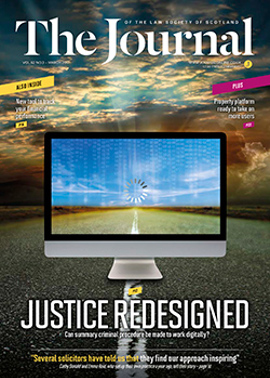A hard race well won

It has been a busy start to the year for Revenue Scotland. I arrived in March, taking over from Eleanor Emberson, when Parliament was concluding its consideration of what is now the Land and Buildings Transaction Tax (Amendment) (Scotland) Act 2016 and work to implement the additional dwelling supplement (ADS) was well underway.
As the Deputy First Minister announced in December 2015, the supplementary rate would be payable on the purchase of additional dwellings from 1 April 2016. While this tight legislative and operational timescale presented challenges, those working in Revenue Scotland were able to draw on the skills and experience honed by successfully delivering the first devolved taxes and launching Revenue Scotland in April 2015 to deliver a complex, technical project with most of the activity concentrated in the final 12 months following the passage of legislation.
Delivering against deadline
The announcement of the ADS required the immediate reallocation of resources and priorities. We had to ensure that our systems and processes were ready for the introduction of the supplement, but had to do so while continuing to administer the devolved taxes and ensuring we maintained business as usual.
Development of the legislation and the accompanying bill documentation was a matter for the Scottish Government, rather than Revenue Scotland. As a key stakeholder, like others, we had the opportunity to contribute views.
Our team at Revenue Scotland identified and developed key work streams and used project management principles and tools to establish key milestones and monitor progress. A project board was established, which included a member from the Scottish Government, and regular progress reports were sent to both the Revenue Scotland board and Scottish Government ministers.
We were also conscious of the need to do as much as we could to raise awareness of the new tax amongst the legal community.
As had been the case with the introduction of the devolved taxes a year earlier, Revenue Scotland adopted a collaborative approach in designing both processes and legislative guidance, albeit on a more truncated timescale. Early in the process, Revenue Scotland published FAQs on its website to make everyone aware of what was involved, while more detailed guidance was being prepared. Once the bill process was completed, we finalised our draft guidance and made it available to representative bodies for external review. The feedback was extremely positive, with constructive comments and suggested revisions, such as including a significant number of case studies to assist in the understanding of the application of the tax to different scenarios. We are very grateful to those who contributed their time and effort to help us provide as clear and helpful guidance as possible.
Systems and tools
The Revenue Scotland SETS system for making tax returns and payments was adapted to capture information on the LBTT tax return for the purposes of the ADS. The system underwent testing by users from a number of different legal firms. As with the guidance, the user testing of the SETS system provided positive assurance, and a particularly pleasing aspect of the project was the successful delivery of the revised SETS system on 1 April.
Revenue Scotland used a wide range of tools to communicate all the changes brought about by the introduction of the ADS, including revisions to our website, messages on Twitter, articles in this Journal, webinars and training events. We also ran events in Aberdeen, Dumfries, Dundee, Edinburgh, Glasgow, Greenock and Inverness to meet with local faculties.
Following the successful implementation of the ADS, we have undertaken a “lessons-learned” exercise, drawing on the views of staff as well as those outside Revenue Scotland who have been affected by the project to look at what went well, areas where improvements could have been made and recommendations for future programmes and projects.
We have benefited from input from the Law Society of Scotland as well as Registers of Scotland in this process. This is far more than a mere reporting exercise – the lessons identified will be put to good use as further powers are devolved in the Scotland Act 2016 following the Smith agreement.
This demanding piece of work has again shown that Revenue Scotland is well placed to meet the logistical and technical challenges brought about by the introduction of devolved taxes, and underlines the critical importance of the collaborative approach we have adopted to our work, showing that, by working closely with and responding effectively to stakeholders and customers, we can deliver a service that is equitable, convenient and efficient.
In this issue
- Sewel in statute: competence or confusion?
- Data protection rewritten
- When divorce and maintenance collide
- Child cases: who decides?
- Deliver us from evil: the totalitarian temptation
- Reading for pleasure
- Opinion: Tom Marshall
- Book reviews
- Profile
- President's column
- Certainty guaranteed with DPA service
- People on the move
- A hard race well won
- EU referendum: choice for a better future
- Of chance and change
- Land reform: back, and here to stay
- Frameworks dismantled
- Charity advice: the full picture
- Lifting the lid on lives
- A judgment on judgments
- Pay: private or transparent?
- Horses make a clean break
- Trustees – damned either way?
- Scottish Solicitors' Discipline Tribunal
- Silverburn: sold on the right to buy
- Career building
- Oops – lost attorneys
- Paralegal pointers
- How will my family know what assets I have?
- Law reform roundup
- Gender pay: squeezing the gap
- The trend is good
- Ask Ash
- Success is in store






